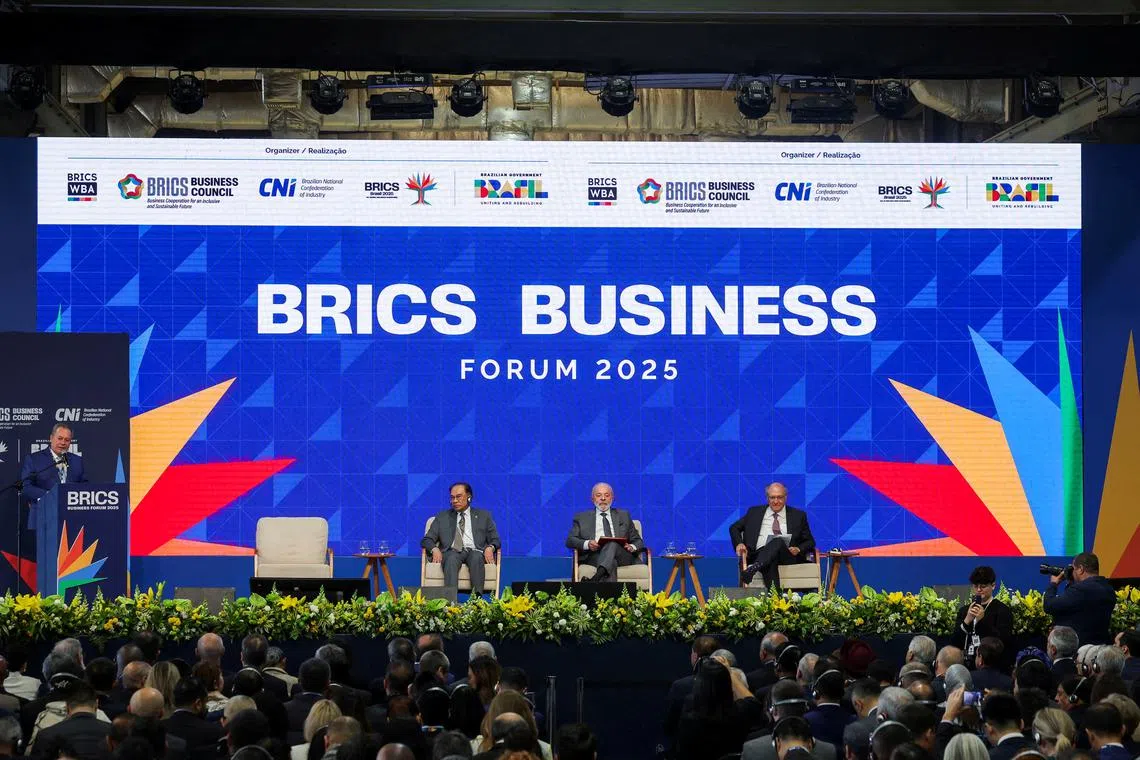Brics nations voice ‘serious concerns’ over Trump tariffs
Sign up now: Get insights on Asia's fast-moving developments

(From left) National Confederation of Industry president Ricardo Alban, Malaysian Premier Anwar Ibrahim, Brazilian President Luiz Inacio Lula da Silva and Brazilian Vice-President Geraldo Alckmin at the opening of the Brics Business Forum in Rio de Janeiro on July 5.
PHOTO: REUTERS
RIO DE JANEIRO - Brics leaders meeting in Rio de Janeiro from July 6 are expected to decry US President Donald Trump’s “indiscriminate” trade tariffs, saying they are illegal and risk hurting the global economy.
Emerging nations, which represent about half the world’s population and 40 per cent of global economic output, are set to unite over “serious concerns” about US import tariffs, according to a draft summit statement obtained by AFP.
Since coming to office in January, Mr Trump has threatened allies and rivals alike with a slew of punitive duties.
His latest salvo comes in the form of letters informing trading partners of new tariff rates
The draft summit declaration does not mention the US or its President by name.
But it is a clear political shot directed at Washington from 11 emerging nations, including Brazil, Russia, India, China and South Africa.
“We voice serious concerns about the rise of unilateral tariff and non-tariff measures which distort trade and are inconsistent with WTO (World Trade Organisation) rules,” the draft text says.
It warns that such measures “threaten to further reduce global trade” and are “affecting the prospects for global economic development”.
Brics leaders are also set to call for protections against unauthorised use of artificial intelligence to avoid excessive data collection and allow mechanisms for fair payment, according to a draft statement seen by Reuters.
Xi no-show
Conceived two decades ago as a forum for fast-growing economies, Brics has come to be seen as a Chinese-driven counterbalance to Western power.
But the two-day summit’s political punch will be depleted by the absence of China’s Mr Xi Jinping, who is skipping the annual meeting for the first time in his 12 years as president.
“I expect there will be speculation about the reasons for Xi’s absence,” said Mr Ryan Hass, a former China director at the US National Security Council who is now with the Brookings Institution think-tank.
“The simplest explanation may hold the most explanatory power. Xi recently hosted Lula (Brazil’s President Luiz Inacio Lula da Silva) in Beijing,” said Mr Hass.
The Chinese leader will not be the only notable absentee. War crime-indicted Russian President Vladimir Putin is also opting to stay away, but will participate via video link, according to the Kremlin.
Mr Hass said Mr Putin’s non-attendance and the fact that Indian Prime Minister Narendra Modi will be a guest of honour in Brazil could also be factors in Mr Xi’s absence.
“Xi does not want to appear upstaged by Modi”, who will receive a state lunch, Mr Hass said.
“I expect Xi’s decision to delegate attendance to Premier Li (Qiang) rests amidst these factors.”
Still, the Xi no-show is a blow to Mr Lula, who wants Brazil to play a bigger role on the world stage.
In the year to November 2025, Brazil will have hosted a Group of 20 summit, a Brics summit, and COP30 international climate talks, all before heading into a fiercely contested presidential election in 2026, in which he is expected to run.
Iran’s President Masoud Pezeshkian, whose nation is still reeling from a 12-day conflict with Israel, is also skipping the meeting.
A source familiar with the negotiations said the Brics countries were divided over how to respond to the wars in Gaza and between Iran and Israel.
Iranian negotiators were pushing for a tougher collective stance that goes beyond referencing the need for the creation of a Palestinian state and for disputes to be resolved peacefully.
But one diplomatic source said the text would give the “same message” that Brics delivered in June when Iran was being bombed by Israel and the US, expressing “concern”.
Besides artificial intelligence, health will also be on the agenda at the summit.
Original members of the bloc Brazil, Russia, India and China have been joined by South Africa and, more recently, by Saudi Arabia, Iran, the United Arab Emirates, Egypt, Ethiopia and Indonesia. AFP, REUTERS


